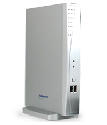“Virtual clients” run Linux
Apr 24, 2006 — by LinuxDevices Staff — from the LinuxDevices Archive — 4 views ClearCube is shipping a Linux-powered “virtual client” that offers secure remote access to a dedicated blade server running Windows XP. The I/Port I8020 client has more inherent security than a laptop, and provides the “full power” of a Pentium 4 from anywhere in the world, according to the company. It targets medical and defense applications.
ClearCube is shipping a Linux-powered “virtual client” that offers secure remote access to a dedicated blade server running Windows XP. The I/Port I8020 client has more inherent security than a laptop, and provides the “full power” of a Pentium 4 from anywhere in the world, according to the company. It targets medical and defense applications.
(Click for larger view of I/Port I8020)
In ClearCube's centralized computing model, each client enjoys exclusive access, via Microsoft RDP (remote desktop protocol), to a single, designated blade server. This differs from the traditional “thin client” model, in which multiple clients share time on centralized servers. However, the underlying technology — RDP — is borrowed from the thin client world, as are the devices themselves.
 ClearCube says its I/Port clients are custom-made by thin-client specialist Neoware. Along with the Linux-based I8020 client, a Windows XP Embedded based I8820 client is available. Additionally, several stock Neoware client devices, including the Capio One (pictured at right) and EON e100, are available through ClearCube running I/Port client software.
ClearCube says its I/Port clients are custom-made by thin-client specialist Neoware. Along with the Linux-based I8020 client, a Windows XP Embedded based I8820 client is available. Additionally, several stock Neoware client devices, including the Capio One (pictured at right) and EON e100, are available through ClearCube running I/Port client software.
ClearCube also offers a “Grid Center” product that allows multiple I/Port clients — typically four — to share a single blade, according to company spokesperson Ken Knott. The company's primary business seems to be blade servers and computing blades based on Pentium 4 processors.
Knott adds that many I/Port users deploy the devices on battery-powered carts, which he says can provide more battery life than laptops. However, the Linux-based I/8020 does not appear to offer wireless networking capabilities.
The I/Port I8020
The I/Port I8020 is based on an AMD Geode processor, clocked at 333MHz. It has 64MB of Flash, and 128MB of RAM. Its video subsystem supports 24-bit color, and resolutions up to UXGA (1600 x 1200), at 85Hz.

I/Port I8020 I/O ports
(Click to enlarge)
I/O includes three USB 1.1 ports (two front, one rear), two PS/2 ports, one serial port, audio I/O, VGA, and 10/100 Ethernet. Supported USB peripherals include DiskOnKey, CD-ROM, floppy, and printers.
Rob Israel, of John C. Lincoln Hospital, stated, “The I/Ports are useless to potential thieves since there is no data stored in the I/Port.”
Availability
The I/Port I8020 is currently available, according to the company. Pricing was not disclosed.
This article was originally published on LinuxDevices.com and has been donated to the open source community by QuinStreet Inc. Please visit LinuxToday.com for up-to-date news and articles about Linux and open source.